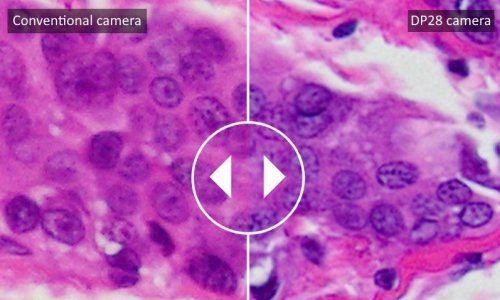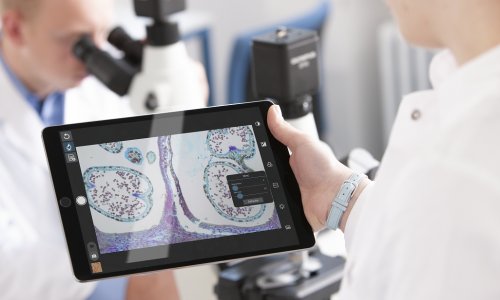AU-Connector transports Olympus to the fast lane
Growing with the lab networks? We'll go for it!
Rising costs, budgets and regulatory requirements have shaken up all medical areas except one — laboratory medicine. Now the wind has changed direction, affecting in-house labs, lab service providers and even manufacturers of related tools, as Daniela Zimmermann discovered during a meeting with Thomas Pracht, Managing Director of Olympus Life Science Europa GmbH.

‘Some of our prime customers are major lab networks and consequently the changes that are currently happening on the lab market affect our business as well,’ he explained. ‘But, as the saying goes One man’s meat is another man’s poison, the changes may well turn out to be very positive for us because increasing price pressure forces many hospitals to outsource their labs. This will be advantageous for lab networks which can only grow by taking on the hospitals’ lab tasks. The networks will have to increase their sample throughput – and that’s where Olympus enters the stage: Our strength is the high-throughput segment. Our analysers are installed in labs where over 5,000 samples are processed every single day. In this segment we are the market leader – ahead of Roche. In the 2,000–5,000 sample/day segment we are number two. The current development – fewer providers handle more samples – fits well into our product concept. We have the opportunity to grow with the lab networks – and we’ll go for it!’
But like any growth won’t this also reach its limits, particularly if and when the consolidation hits the diagnostics sector. What is Olympus’s mid to long-term strategy, and what role does automation play in this? ‘There is still enormous potential for innovative product developments,’ he pointed out, ‘and we will continue to focus on automation. However, we do not consider large lab lines a convincing solution. Our approach is to optimize high throughput analysers because, in our opinion, today speed is the crucial problem with many systems. The technologies are good, but they cannot be used efficiently on the slow lines. It’s a bit like driving a Porsche along a bumpy country lane. All the sophisticated technology is useless – you simply have to drive slowly. Olympus wants to turn the bumpy lane into a highway in order to optimize existing automation technology. Our highway is called AU-Connector. It links the different analysers for clinical chemistry and immuno-chemistry and ensures that all samples are processed automatically – at the speed of a Porsche! In a next step, results will be fed directly into the hospital information system. Today, that is still a problem due to the many standards in the different hospitals. But we are sure a solution is around the corner.’
A further strategic focus, he added, is strengthening immuno-chemistry. ‘Unlike Roche, which offers a wide range of services, we specialise in clinical chemistry. But in the future we will also be specialists in immuno-chemistry. That’s our goal: to be specialists in clinical and immuno chemistry.’
The company can rely on the well-tried quality of its products and draw on its comprehensive experience in clinical chemistry, he emphasised. ‘We expect to reach this goal in about five years. We are optimistic because Olympus has a crucial asset: we produce all components for a diagnostic system in-house: hardware, software, reagents. Particularly in immuno-chemistry the development of reagents is an extremely complex process and requires intensive development efforts, which we can afford because we have the know-how and expertise in-house. Thus we can react quickly to market developments – a major competitive advantage.’
Asked about plans for molecular medicine, he referred to the Olympus acquisition of Advalytix AG about three years ago, which helps to shape that sector. ‘We want to jointly develop PCT technologies that will play an important role in decoding genetic material. We expect these research & development efforts to result in a number of exciting diagnostics projects in the next few years. Nevertheless, as far as molecular medicine is concerned, we also co-operate with manufacturers in the in-vivo segment – another area with great potential for the future.’
Does he have a concept about the labs of the future? ‘I guess the instruments in the future laboratory will shrink in size yet still be able to handle the demand of one or even several hospitals. Automation will continue, so that only two people will be required to operate the systems. Not necessarily a pleasant outlook but that will be develop, whether we like it or not.’
Olympus Life Science Europa GmbH - Diagnostics
Based in Hamburg, the firm produces systems for in vitro diagnostics, having a long tradition in clinical chemistry, electrophoresis, transfusion testing and laboratory automation, for markets in Europe, Africa and the Middle East. With the development of its AU3000i immunochemistry system and the consolidated AU-Connector system, Olympus could expand diagnostic services across disciplines and increase the speed and throughput of the systems.
Despite moderate growth in this market, for 2006/2007 Olympus Diagnostics recorded a sales volume of ?179.2 million – a rise of 4% over the previous year.
30.11.2007





